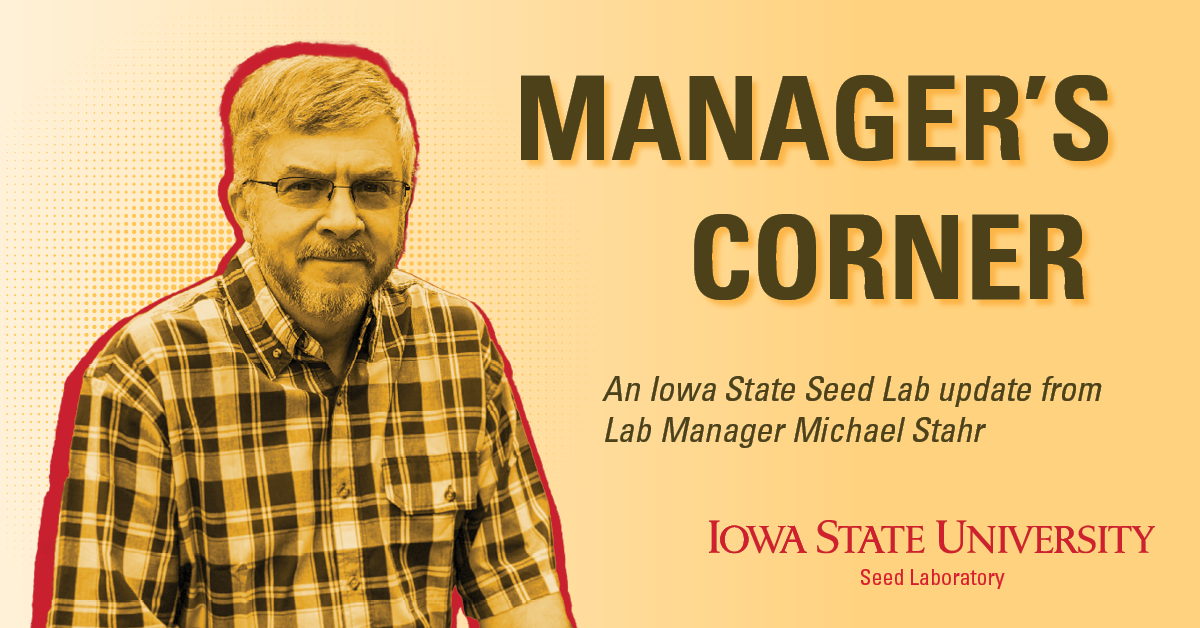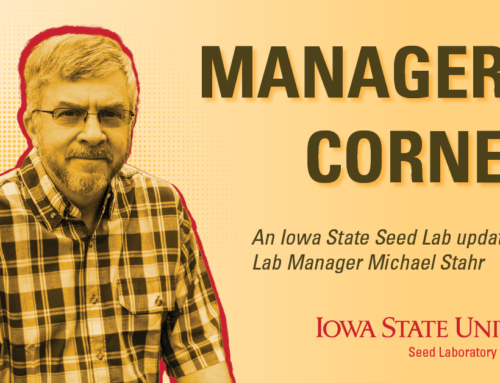A great deal has occurred since writing my last Manager’s Corner column in February. My staff and I have completed the two weeks of ISU Seed Analyst Short Course training, an American Seed Trade Association (ASTA)-sponsored summit on Palmer amaranth was held recently in Des Moines, and the joint Association of Official Seed Analysts (AOSA), Society of Commercial Seed Technologists (SCST), and International Seed Testing Association (ISTA) meeting in Denver is fast approaching.
2017 Germination and Purity Short Course Training A Success
Our ISU Seed Analyst Short Courses, held the first two weeks of May (Germination the first week, and Purity the second), once again included many hands-on activities and offered exposure to many species of seed and several testing methods. During Germination week, we spent a full day on tetrazolium (TZ) testing. Participants prepared and evaluated a number of species using TZ methods. Purity week also offered hands-on experiences on a wide range of seed species and numerous helpful hints for seed identification. A special highlight of Purity week this year was the inclusion of two exceptional webinars provided by Jennifer Neudorf of the Canadian Food Inspection Agency. Jennifer discussed ways to differentiate species of grass seed and tips for separating Brassicas. As always, both weeks of the short course concluded with their respective AOSA and SCST consolidated exams (germination and purity). The Iowa State University Seed Lab is proud to be one of only a few locations in the U.S. offering the AOSA and SCST tests each year.
Industry Meets to Discuss Palmer Amaranth Concerns
Seed industry professionals and government officials recently convened in Des Moines to discuss issues relating to the prevention of the further spread of Palmer amaranth in the U.S. In the span of a little more than a year, the map of Palmer amaranth infestation in Iowa, which initially included one county in the southern part of the state, and one county in the northwest area of the state, transformed into a virtual checkerboard of affected counties. There continues to be disagreement on how this staggering progression took place. A focus on testing to identify high purity seed lots will undoubtedly slow the spread of Palmer amaranth. It is common knowledge that Palmer seeds are visually indistinguishable from several other Amaranth species. As a result, the only viable options at this time are a grow-out of suspected seeds or a DNA test. Although a DNA test is a highly accurate option, this high-tech solution comes with a significant cost: $100 per seed (with price breaks at 28 and 49 seeds tested). It will be interesting to see how this situation plays out.
AOSA/SCST/ISTA Meeting in Denver a Unique Opportunity for Seed Professionals
A once-in-a-lifetime opportunity for seed industry professionals to take part in a global meeting of the minds will take place June 16-23, 2017, in Denver. The joint AOSA/SCST/ISTA meeting will kick-off June 16-18 with four workshops preceding the meeting followed by numerous symposiums, research presentations, and committee meetings following on June 19-22. The event will conclude with a June 23 day-long tour of local seed-related points of interest: Applewood Seed Company, Eurofins STA Lab, and the National Lab for Genetic Resources Preservation. Throughout the week, a number of AOSA, SCST, and ISTA committees will hold joint meetings. As a result, attendees from around the world will have an opportunity to take part in Rule-proposal discussions and other dialogues relating to issues affecting all three organizations. In fact, 28 AOSA Rule change proposals are scheduled for consideration in Denver, on issues ranging from adding native seed species to the Rules, adding a procedure for working with super chaffy seed species to the Rules, to Rule changes reflecting advancements in seed counters. Both the ISU Seed Lab and the ISU Graduate Program in Seed Technology and Business will have a booth at the AOSA/SCST/ISTA meeting in Denver. Be sure to take time out to stop in and visit with us!
For more information about the meeting, visit: http://www.analyzeseeds.com/2017am/.
—Mike Stahr, ISU Seed Lab Manager


